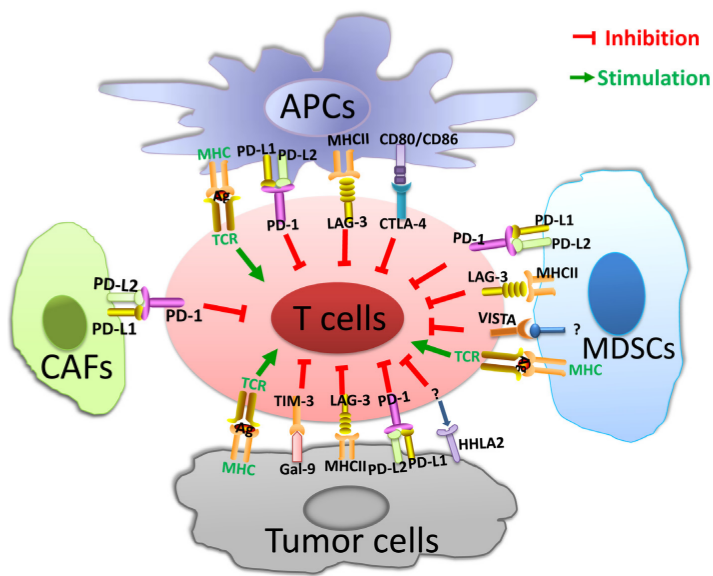LAG-3: un nuovo checkpoint immunitario. Cancro & Malattie autoimmuni
Inibitori LAG-3 & Cancro … LAG-3 & Malattie autoimmuni
Negli ultimi decenni, i checkpoint immunitari hanno raccolto l’interesse dei ricercatori, e LAG-3 è probabilmente il prossimo checkpoint immunitario più studiato dopo PD-1 e CTLA-4. Simile alle altre proteine del checkpoint immunitario, LAG-3 inibisce la funzione delle cellule citotossiche dopo essersi legato al suo ligando, che è principalmente la molecola MHC di classe II.
Allo stesso modo, si lega anche a LSECtin, FGL1 e Galectin-3 come parte dei percorsi indipendenti MHC di classe II, esercitando ulteriori effetti immunosoppressivi. Il LAG-3 presente nelle cellule Treg inibisce anche la proliferazione delle cellule dendritiche ( DC ). In un altro studio, è stato scoperto che la segnalazione LAG-3 sottoregola la proliferazione delle cellule NK.
Pertanto, con i suoi effetti di inibizione della proliferazione e dell’attivazione di un certo numero di cellule immunitarie, LAG-3 sviluppa un ambiente immunosoppressivo, che favorisce la proliferazione tumorale e le metastasi. Questa proprietà di LAG-3 lo ha messo alla ribalta come potenziale bersaglio per lo sviluppo di farmaci e terapie diretti verso LAG-3.
Oltre al cancro, si ritiene anche che LAG-3 abbia un ruolo nello sviluppo della malattia autoimmune e nell’induzione dell’autoimmunità. Negli studi preclinici con modelli murini diabetici non-obesi ( NOD ), l’assenza di LAG-3 è stata collegata a un’incidenza del 100% di diabete a un ritmo accelerato, altrimenti ritardato. La causa di ciò era la proliferazione delle cellule Treg in assenza di LAG-3. In un altro esperimento, è stato riferito che la carenza o l’inibizione del LAG-3 aumentava la suscettibilità del modello allo sviluppo dell’autoimmunità indotta dal mercurio.
Ulteriori ricerche hanno dimostrato che LAG-3 agisce in sincronia con il checkpoint immunitario PD-1 per ritardare o diminuire la possibilità dell’inizio di malattie autoimmuni e che l’esaurimento immunitario è collegato a malattie autoimmuni meno gravi.
Da questi studi di ricerca, è ovvio che l’inibizione delle cellule immunitarie da parte di LAG-3 è sia “amica” che “nemica”. Nel caso del cancro, la soppressione del sistema immunitario è dannosa per il corpo, ma in altri casi la crescita incontrollata delle cellule T è stata collegata allo sviluppo di malattie autoimmuni.
Il ruolo di LAG-2 è stato studiato principalmente in riferimento al cancro e molti inibitori sono stati sviluppati e sono in corso di valutazione in studi clinici; tuttavia, mancano ancora studi che analizzino il suo ruolo nello sviluppo e nella progressione delle malattie autoimmuni e delle malattie infettive.
LAG-3 ha un meccanismo d’azione complesso e i ricercatori non sono stati in grado di comprendere appieno le sue funzioni e il suo potenziale terapeutico. Ciò richiede una ricerca più approfondita per comprendere la proteina e le sue interazioni e la misura in cui questi fattori possono essere sfruttati per curare le malattie.
LAG-3 & Cancer & Autoimmune diseases
In the last few decades, immune checkpoints have garnered the interest of researchers as a result of which LAG-3 is probably the next most studied immune checkpoint after PD-1 and CTLA-4. Similar to the other immune checkpoint proteins, LAG-3 inhibits the function of cytotoxic cells after binding to its ligand, which is mainly the MHC class II molecule.
Similarly, it also binds to the LSECtin, FGL1, and Galectin-3 as part of the MHC class II independent pathways, exerting additional immune suppressive effects. LAG-3 present in Treg cells also inhibits the proliferation of dendritic cells ( DC ). In another study, it was found that LAG-3 signaling downregulated the proliferation of NK cells.
Therefore, with its effects inhibiting the proliferation and activation of a number of immune cells, LAG-3 develops an immunosuppressive environment, which fosters the proliferation and metastasis of cancer tumors. This property of LAG-3 has put it in limelight as a potential target for developing drugs and therapies directed towards the LAG-3.
Apart from cancer, LAG-3 is also said to have a role in the development of autoimmune disease and the induction of autoimmunity. In preclinical studies with non-obese diabetic ( NOD ) mouse models, the absence of LAG-3 was linked with a 100% occurrence of diabetes at an accelerated rate, which was otherwise delayed. The untapped proliferation of Treg cells in the absence of LAG-3 was the cause of this. In another experiment, it was reported that the deficiency or inhibition of the LAG-3 increased the model’s susceptibility to developing autoimmunity induced by mercury.
Further research showed that LAG-3 works in sync with the PD-1 immune checkpoint to delay or decrease the possibility of the initiation of autoimmune diseases and that immune exhaustion is linked with less severe autoimmune diseases.
From these research studies, it is obvious that inhibition of immune cells by LAG-3 is both friend and foe. In the case of cancer, suppression of the immune system is detrimental to the body but in others, unchecked growth of T cells has been linked with the development of autoimmune disease.
The role of LAG-2 has been mainly studied in reference to cancer and many inhibitors have been developed and are being evaluated in clinical trials; however, studies analyzing its role in the development and progression of autoimmune diseases and infectious diseases are still lacking and there is a dearth of medications in the pipeline to address this problem.
LAG-3 has a complex mechanism of action, and researchers have not been able to fully understand its functions and its potential in the treatment of diseases. This calls for more thorough research to understand the protein and its interactions and the extent to which these factors can be exploited to benefit humans by treating disease. Future research also needs to focus on the effects of LAG-3 inhibition on other cells apart from the conventional T cells.
Xagena Oncologia
MelanomaOnline.net | OncoGinecologia.net | OncoImmunoterapia.net | OncologiaMedica.net | OncologiaOnline.net | TumoriOnline.net | TumoriRari.net


